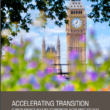The IFRS Sustainability Disclosure Standards, issued by the International Sustainability Standards Board (ISSB) have come into effect from the financial years starting on or after 1st January 2024. However, the actual implementation date will depend on the regulators in each jurisdiction. Companies should start preparing for the new sustainability reporting requirements to ensure compliance. The new ISSB Standards include IFRS S1 General Requirements for Disclosure of Sustainability-related Financial Information and IFRS S2 Climate-related Disclosures.
Transitioning to new ways of reporting sustainability-related financial information is a significant change for companies. However, there are several in-built reliefs for the first year of reporting to make the transition to the new standards less daunting.
Here are the top five transition reliefs available under the new standards in their first year of reporting that every company should know:
First, in the first year, companies using S1 only need to report on climate-related risks and opportunities as set out in S2. They can choose not to report on other sustainability-related risks.
Second, companies are not required to provide scope 3 greenhouse gas emissions data in the first year of reporting with S2. This data is only needed from the second year onward.
Third, companies can continue using their previous greenhouse gas measurement method for the first year instead of the GHG Protocol. From the second year, they must use the GHG Protocol for measuring emissions.
Fourth, in the first year, companies can report their sustainability-related financial disclosures after publishing their financial statements. S1 allows them to provide annual sustainability information with their half-year financial report. If a company doesn’t provide a half-year report, it can report sustainability disclosures within nine months of the annual period’s end. From the second year, companies must align the sustainability reporting cycle with their financial statements.
Fifth, companies are not required to provide disclosures for previous periods in their first annual report using the ISSB standards. Therefore, comparative information is not needed in the first annual reporting period. If a company reports only on climate-related disclosures using S2 in the first year, it does not need to provide comparative climate-related information. If the company reports on other sustainability-related risks and opportunities starting in the second year, it does not need to provide comparative information for these in its first report. In the second year, the company will provide comparative information for climate disclosures but not for other sustainability-related disclosures. From the third year, the company will provide comparative information for all disclosures.
“These reliefs are important in easing the transition to the new ISSB standards. They provide crucial flexibility, allowing companies to adapt smoothly and focus on building strong sustainability practices,” says Rajesh Chhabara, Managing Director at the Singapore-based sustainability consulting firm CSRWorks International, which helps companies prepare reports in accordance with the ISSB Standards. “We are committed to guiding businesses through this process to ensure compliance and drive sustainable growth.”















